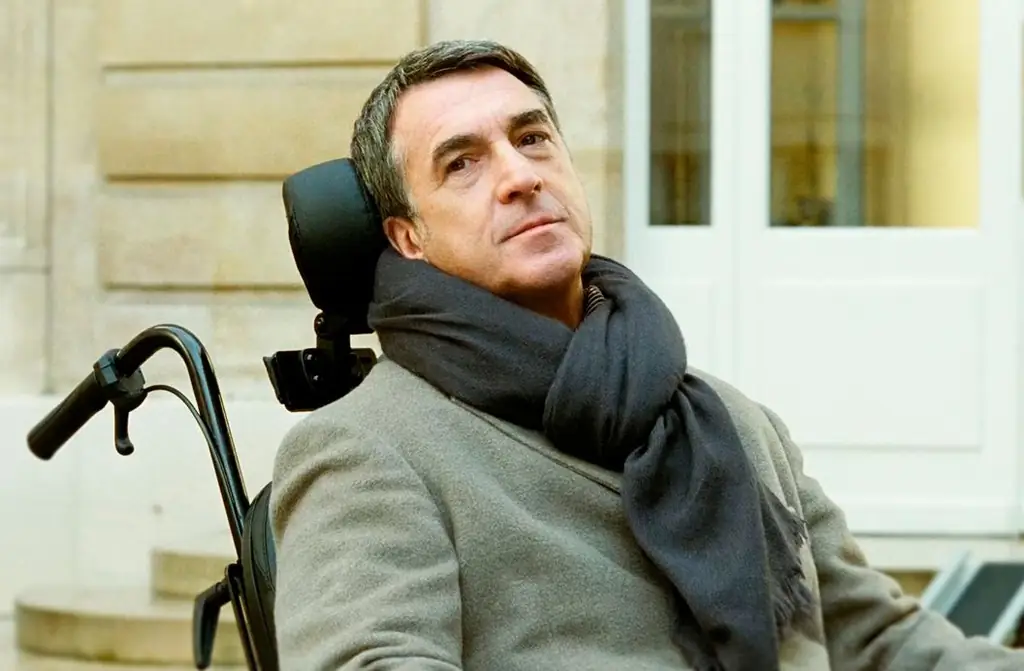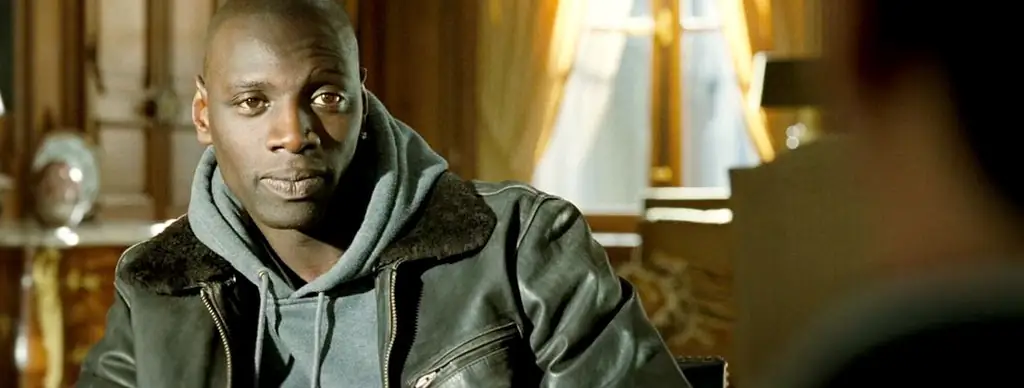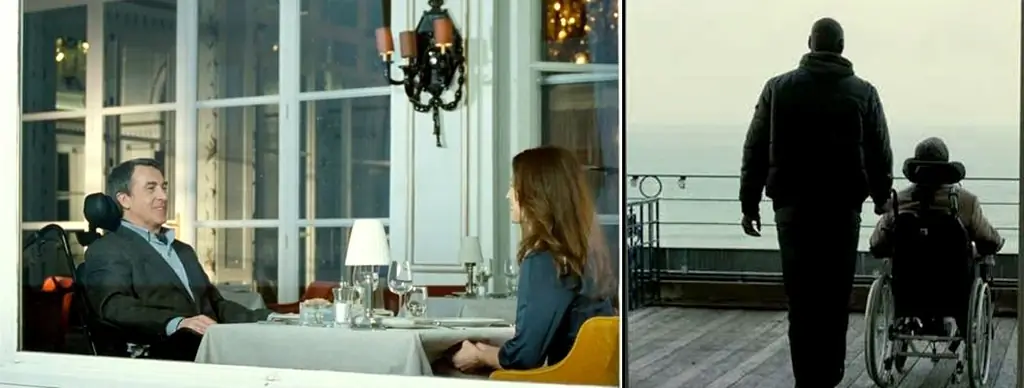- Author Adrian Jeff jeff@psychologosportal.com.
- Public 2023-12-17 05:06.
- Last modified 2025-01-24 14:09.

The film "The Untouchables". Systems Vector Psychology recommends
The potential hidden from us, moreover, distorted by the stress of unfulfillment, manifested in the form of underdeveloped, archetypal properties (theft, insensitivity, rudeness), can be revealed. You just need to know how to do it …
There are films that touch the quick. The film "The Untouchables" (2011, the second title is "One Plus One") is one of them. And this is no coincidence, because it is deeply systemic. Moreover, it was based on a real life story. So, we are watching a movie through the prism of System-Vector Psychology of Yuri Burlan.
Uncouth blockhead
A young black immigrant from Senegal named Driss is looking for a job in Paris. Rather, he is not even interested in work, but in the allowance that will be assigned to him when he receives three refusals from employers. For this purpose, he ends up in the house of a rich disabled aristocrat Philip, among other applicants for a place of nurse with him.
The requirements are simple and complex at the same time: you need to look after an adult man who only moves his head, all other parts of the body are immobilized, and who moves in a wheelchair. From 7 o'clock in the morning, procedures begin - massage, morning toilet, then dressing, feeding, walking, entertainment. All day you have to stay close to the patient all day, and at night keep in touch with the help of a radio.
Driss is not going to stay in this house, although after a beggarly existence, a rich house, a luxurious bedroom allocated especially for a nurse, amaze his imagination. He only needs a refusal mark. However, the owner of the house, for some unknown reason, suddenly persuades him to stay on probation. The young man agrees only out of despair, after his adoptive mother kicks him out of the house.
Everyone is surprised by the choice of Philip. Who is this guy without even a special medical education? Not to mention the fact that he is just an uncouth blockhead, rude, ill-mannered, eager to dodge work in order to live on welfare. Plus he's not in good standing with the police. He sat for six months breaking into a jewelry store. A man from the street who cannot be trusted, as one of his relatives assures Philip. “Be on the lookout, the guys on the street don't know pity,” he says.
To which Philip replies: “This is the whole point. I don’t want to be pitied.” Tired of the sad faces of those around him, he sees in this guy a healthy life force, the energy of youth and joy, which could bring a spark of revival into his stagnant life.
Degradation involuntarily
For Driss, Philip's work marks a turning point in his life. What does he have at the beginning of this experience? Complete lack of implementation in a foreign country.
Here it is important to understand what psychological properties Driss has, how exactly he could realize himself. System-vector psychology of Yuri Burlan explains that the psychological properties of a person depend on his vector set. A vector is a set of innate human properties that determine his desires and potentialities. There are eight vectors in total: cutaneous, anal, visual and others. One person can have from one to eight vectors, in a modern person, as a rule. there are 3-5 vectors.
Driss is a capable young man with an ano-cutaneous-visual bundle of vectors. He finds himself at the very bottom of society, among homeless people and laborers, as well as just people on welfare. For any person, this is the stress of unrealization. According to Yuri Burlan's System-Vector Psychology, in the skin vector, he can respond with a tendency to theft, which is confirmed by the story of Driss. He was already sitting for an attempt to steal, but his hands are still reaching out to steal something. Once in Philip's house, the first thing he does is steal a Faberge egg.
Driss's visual vector is not in the best condition either. It can be seen that by nature he is a kind person. Since childhood, he has lived with foster parents, but as a family he takes care of his cousins and sisters. Loves his aunt, who replaced his mother. With pain he looks at her, tired after hard and unskilled work, which does not bring any joy and satisfaction. However, living in the harsh conditions of almost animal survival made him emotionally closed and sometimes even vicious towards people.
At first, he tactlessly jokes about the state of his disabled owner, mercilessly pours boiling water on his insensitive legs, refuses to put elastic stockings on him and “wipe his bottom”. He really does not feel sorry for his ward at all, sometimes openly laughs at him, makes him feel helpless. He almost beats up a neighbor who constantly parks at the gate of their house. He is "insane, cruel" - this is how the housekeeper Yvonne describes him. This is how Driss's anal vector manifests itself, which at that moment was not in the best condition.
But the owner suffers, because Driss is there, deep inside - very nice, and Philip, as the owner of developed sound and visual vectors, feels people well. Deprived of many human joys, he really has nothing to lose. All that remains is to observe people.

Leap into implementation
Under the influence of a good environment, which, according to Yuri Burlan's System-Vector Psychology, is very important for unlocking a person's potential, Driss begins to gradually change. He is a very capable, even developed person, simply degraded in the absence of realization.
In a house filled with classical music and painting, it absorbs culture like a sponge. He has the ability for this, which is set by the visual vector. He begins to paint - this is how the potential of his anal-visual ligament of vectors, which gives the world the best artists, finds a way out. Philip sells his first painting for 11,000 euros. It is not much different from the surreal creations of the famous masters of our time.
He learns to communicate and becomes a pleasant conversationalist. And this is due to the innate visual interest in people awakened in him. He begins to feel other people, their states. Constant concern for Philip, who has already become a friend for him, a close person, awakens in him all the huge, dormant emotional potential until then. But it is no longer enough for him to care only about him. In his circle of attention, he includes Philip's restless daughter, and an insecure housekeeper, and bored guests at Philip's birthday party.
He wants to cheer them up, give them what they lack so much - a kind word, attention, love, finally. And so he becomes a kind of wizard, arranging their fate. Philip is a man who has not lost his thirst for life, and, despite his physical weakness, suffers greatly from a lack of love. He is involved in an epistolary romance with a woman he has never seen. Driss arranges their meeting, which in the real story of the prototype Philip, who is also called Philip, as in the film, ends with a wedding and continues with the birth of two girls.

He makes the abuser of Philip's daughter wear croissants for her every morning, and he pushes the housekeeper Yvonne to a date with the gardener with whom she did not dare to have an affair. All people next to him find their happiness, and he, in the end, his own. In real life, the prototype Drissa Abdel opens his own business, gets married and has three children. The prototypes of Philip and Driss, like the heroes of the film, are still great friends in life.
What is the happiness of life?
Realization of their properties, especially to the maximum, gives a person incomparable pleasure from life. Warmth, love, kindness, so characteristic of visual people, should be given to other people, and then this goodness brings happiness both to themselves and to those around them. This is how everything is arranged, and there is nothing surprising or fabulous in it.
As Yuri Burlan's System-Vector Psychology says, the greatest potential is revealed in visual people who take care of sick people, disabled people, which is shown to us in the film "The Untouchables".
The potential hidden from us, moreover, distorted by the stress of unfulfillment, manifested in the form of underdeveloped, archetypal properties (theft, insensitivity, rudeness), can be revealed. You just need to know how to do it.
To see what a person with a visual vector is capable of in a state of full realization, you can watch the film "The Untouchables". And in order to really change your life, you can come to classes in System-Vector Psychology, get to know yourself and others and find true happiness in life, which is revealed only in full-fledged connections between people. Thanks to the story of Philip and Abdel, we see that this is possible. Register for free online lectures at the link:






